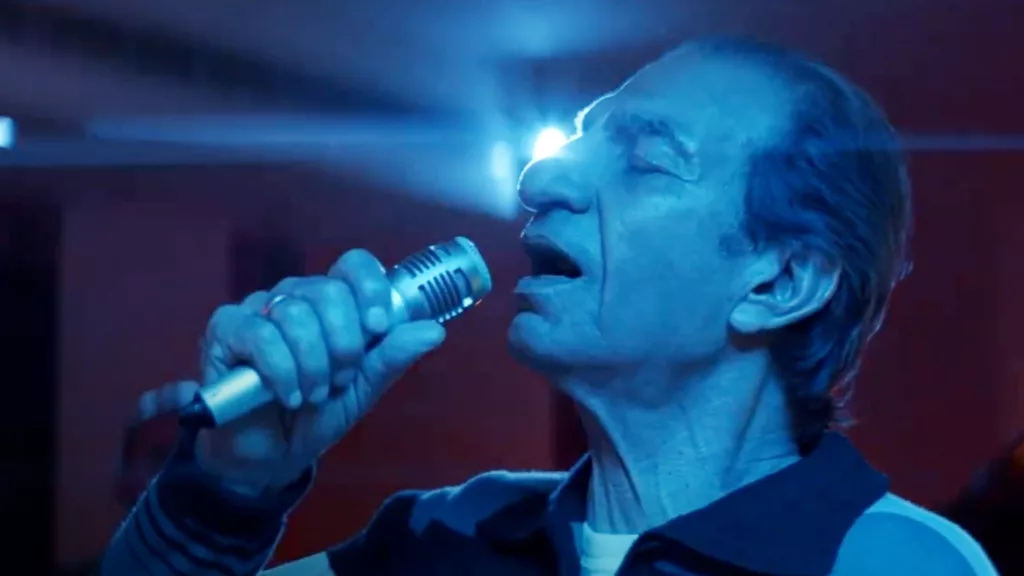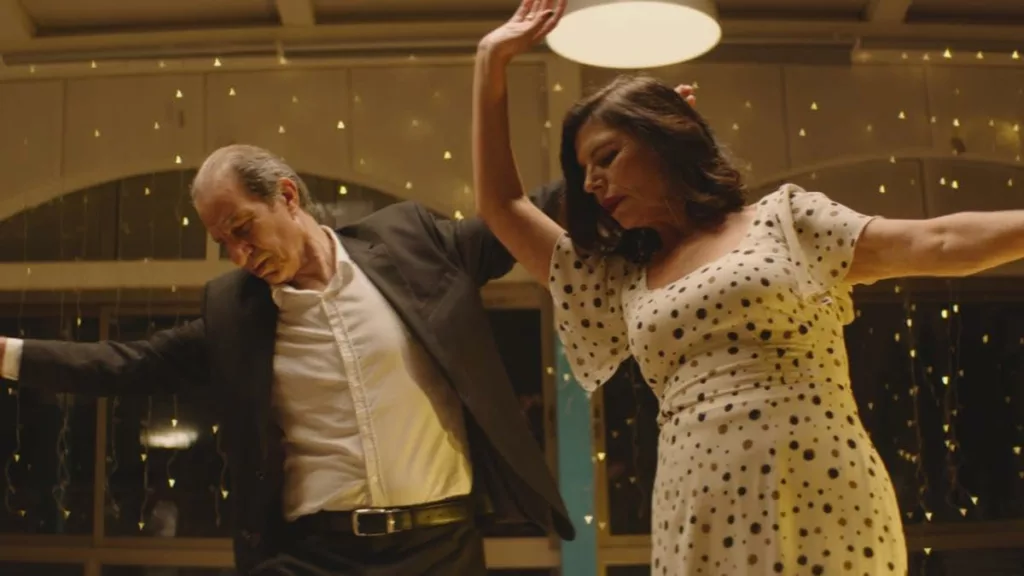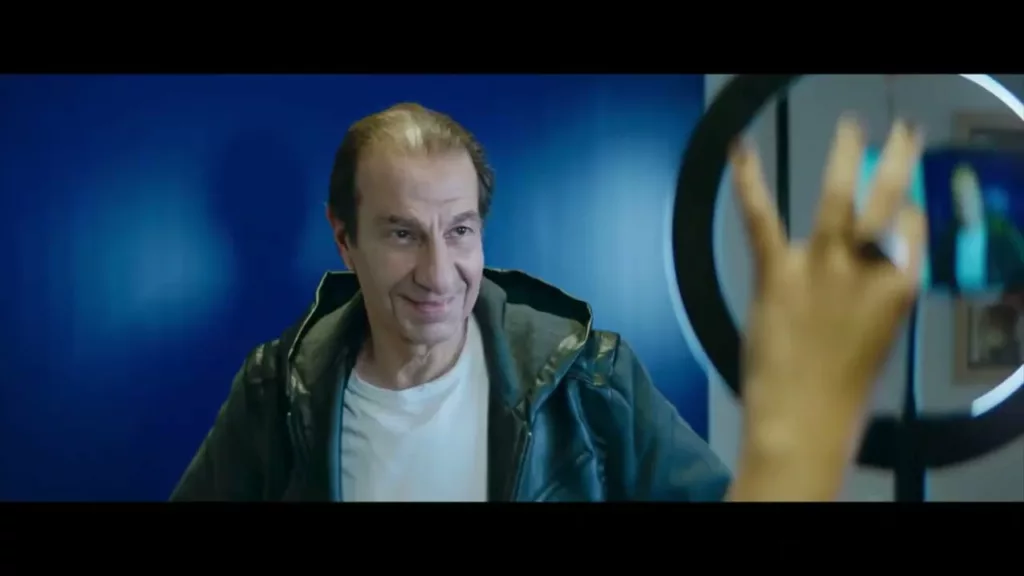Set in modern-day Tel Aviv, Moshe Rosenthal’s 2022 film Karaoke centers around Meir and Tova, a retired couple who have been married for 46 years. Living a quiet, comfortable life in their apartment building, the world of Meir and Tova is gently upended by the arrival of their flamboyant neighbor, Itzik.
Played vibrantly by Lior Ashkenazi, Itzik is a wealthy bachelor who enlivens the building with his penthouse karaoke parties. When Meir and especially Tova, portrayed with heart by Rita Shukrun, find themselves drawn into Itzik’s glamorous orbit, it sets in motion reflections on identity, partnership, and what truly matters as life’s final acts unfold.
Subtle and scrumptious performances by its leads breathe life into this contemplative tale of relationships both enduring and ephemeral. With empathy and insight, Karaoke provides a quiet reflection on the ties that both bind and evolve over time.
The Midlife Shift
Meir has settled into a quiet retired life with his wife Tova, enjoying routine dinners with their daughters and visits to familiar places. But behind his placid exterior, something is missing. When the flamboyant Itzik bursts into their world, Meir is transfixed by this man, fully living in each carefree moment. Here is someone who pursues every passion, holding nothing back.
Meir had long stifled that adventurous spirit, focusing on stable responsibility instead of authentic joy. Seeing Itzik rekindles dormant longings, and Meir finds himself awakening to desires left untapped. He eagerly participates in Itzik’s unrestrained activities, tasting freedom for the first time. Meir begins to question if he truly knows himself after 46 years on autopilot.
Tova prides herself on grace and control. As Meir slips from her grasp, she redoubles efforts to assert influence. Where Meir simply observes Itzik in awe, Tova views him as a rival for attention. She throws herself into beautifying for his parties, desperate to outshine the younger women there.
But beneath her manicured exterior, Tova also feels the emptiness of a life lacking new opportunities. Witnessing Meir’s transformation awakens doubts about her own fulfilled existence. When Itzik remains oblivious to her charms, Tova spirals into insecurity and jealousy towards her husband’s bond with this man.
Itzik lives entirely in the moment, surrounding himself with superficial pleasures. But his glamorous public persona masks deep loneliness. Seeking validation through lavish displays, Itzik finds only temporary catharsis in exciting others.
None know the real man beneath expensive façades and flirtatious grins. When Meir and Tova glimpse beyond this surface, Itzik panics, afraid to be seen without his glittering armor. He lashes out, trying to prove superiority, yet only highlights his own vulnerability. Ultimately, Itzik remains unfulfilled, unable to shed shields and find a real connection.
Stirrings of Change
Director Moshe Rosenthal allows rich moments to emerge slowly in Karaoke. In tense scenes between Meir, Tova, and Itzik, not a word needs to be said. Subtle facial expressions and body language speak volumes, as Rosenthal understands these characters deeply.
In single glances, we see each other’s longing and doubt, concealed pride, and hidden pain. His direction trusts viewers to appreciate such nuanced interaction.
The apartment building itself becomes another character. From their balcony, Meir and Tova gaze up enviously at the parties in Itzik’s penthouse, feeling their own lives lack such vigor. Their high-rise feels both sleek and claustrophobic as neighbors watch each other. Rosenthal uses this setting to show how physically close yet emotionally distant residents may be. It perfectly mirrors how Meir and Tova start to see their marriage.
Music plays a key role in more joyful scenes, like Itzik’s lively karaoke nights. Songs take on powerful double meanings as characters pour soul into the lyrics. The film’s closing moments also involve music, but in a much more intimate way that packs an emotional wallop. Rosenthal understands how perfectly concluding a story can bring it full circle and leave an impact.
Messages Between the Notes
Meir and Tova find their quiet worlds upended upon meeting Itzik. Married for decades, they’ve fallen into comfortable routines with the passions of youth long past. Itzik, by contrast, lives freely, constantly performing as the life of a luxurious party. Seeing this awakens desires in Meir and Tova to break from stagnation.
Meir delves headfirst into Itzik’s flashy orbit, intoxicated by this vision of unfettered living. But is Itzik’s gilded lifestyle all that it seems? Underneath surface opinions, deeper questions emerge. Itzik adopts the persona of a wealthy playboy, hiding insecurities through charisma and excess. But empty performance cannot replace fulfillment within.
Meanwhile, Meir begins to reexamine where his true identity and desires lie outside the roles of father and professor, rediscovering buried parts of himself. Even Tova grows restless, awakening to life’s possibilities beyond family and shop routines. Their meeting shakes loose presumptions, unveiling an interior world richer than imagined.
Between Meir and Itzik, intimacy emerges, the line blurring between friend and something more intense forms. But Itzik remains distant, unable to offer the emotional bareness that true intimacy requires. Through Itzik, Meir learns that attractiveness alone does not nourish the soul. In the end, he finds renewal in emotional honesty—with himself—and in the enduring love of caring for Tova.
Acting with Heart & Soul
Sasson Gabay delivers a tour-de-force performance as Meir. Far from the “meek loser” others have portrayed, Gabay brings nuance and depth to a man lost amid life’s rhythms. As Meir encounters the carefree Itzik, awaking dormant dreams, Gabay makes us feel each flicker of passion rekindled and each rippling doubt.
In tense moments between the men, Gabay leaves us hanging on Meir’s every subtly played emotion. We root for this good man to reclaim self-worth and celebrate each small step as a victory. Rarely does a leading man elicit such rich empathy through understated genius.
As Tova, Rita Shukrun plays riotous complexities lying just beneath her character’s stern facade. Fiercely protective of the domain yet inwardly restless, Shukrun injects Tova with backroom vulnerability, wounded pride, and unspoken yearnings. She commands each scene fiercely, an unforgettable titan straddling control and chaos. Whether seething in self-righteous fury or cracking open a painful truth, Shukrun’s nuanced mastery drives Tova from page to flesh in a way few supporting roles ever achieve.
Lior Ashkenazi irresistibly draws all into Itzik’s orbit through roguish charm, yet a wounded loneliness simmers under glamour’s glow. Ashkenazi lets slip, in fleeting gestures, the man clinging to flash as anchors slip away. It is this subtle complexity that ignites the film—two fine souls now stirring in Itzik’s passionate wake.
A Moment of Truth
The climactic scene between Meir and Itzik is truly compelling. We’ve seen their friendship blossom as vibrant Itzik awakened dormant hopes within reticent Meir. But cracks have emerged in Meir’s marriage as he basked in Itzik’s radiance.
Now, alone together, tensions rise. Itzik abruptly states that he could never settle as Meir has. Meir is stunned by this rejection of his lifestyle—had he not embraced Itzik’s spirit? Silence hangs thickly.
Then Itzik’s guarded words pierce deeper. Meir has changed to impress a “friend,” chasing thrills over substance. Itzik sees through facades to the man beneath, and his verdict stings. Meir crumbles, gutted by the dismantling of his new identity.
As Itzik leaves, Meir stands broken, confronting harsh truths: his hollow quest for relevance and the cost of his marriage. But in ruins lies rebirth. Alone, he rediscovers the strength within, forgotten amid flashes and fevers. His pain brings clarity and courage to embrace his true self—husband and scholar, not Itzik’s mimic.
In tense economic times, Sasson Gabay bares Meir’s very soul. We ache with his losses and rise with his renewal. This intense scene triggers a metamorphosis as Meir sheds his disguise and reclaims his dignity. Simply yet powerfully, it is the dramatic peak where illusion shatters and character forms.
Still Singing: When Karaoke Ends
This simple film exerts quiet strength. With empathetic direction and performances that pierce the soul, Karaoke meditates on marriage, legacy, and what truly ignites us.
Meir and Tova warmly represent decades together yet also live half-lived lives. We see the comfort but also the stiflingness, as routines rule their days. When vibrant Itzik appears, doors open—but illusions too. His flash draws Meir to strangely emulate him, forgetting who he is.
Yet all is not as it seems. Slowly, truths emerge: Itzik’s shine masks deeper lacks, while Meir possesses unplumbed depths. Through turmoil, Meir and Tova find themselves and each other anew—rekindling that earliest fire while accepting life’s impermanence.
Quietly, Karaoke reminds us that within each soul burns a yearning for meaning, connection, and adventure. But also, answers begin at home if we have eyes to see with compassion. As love brings Meir and Tova full circle once more, dancing in joy, we feel life’s bittersweet dance goes on—and it is in ourselves, not others, that self-fulfillment ultimately rings clearest.
The film stays with you because, through deft hand and heart, it holds a mirror that reflects our shared humanity back in its complexity. When the screen dies to black and the final notes fade, the songs in our own hearts—of love, longing, and conquest of doubt—yet sing on.
The Review
Karaoke
Karaoke is a thoughtful film that explores the intricacies of intimacy, identity, and what truly nourishes the human spirit. Through modulated performances and Rosenthal's empathetic direction, it contemplates our perpetual search for meaning and connection, often finding answers in unexpected or previously overlooked places. While straightforward in story, Karaoke achieves nuance and depth by honoring the complexity of its characters and viewing them with equal parts compassion and insight. In the end, it leaves one reflecting not just on its principles of sustaining love, confronting illusions, and reawakening wonder within lifelong relationships, but also on our own hearts and lives with richer understanding.
PROS
- Nuanced characters and performances that feel authentic
- Thoughtful exploration of themes like identity, intimacy, and what sustains a marriage long-term
- Gentle direction that balances humor with heart
- Promotes reflection on lasting relationships and rediscovering oneself
CONS
- The story follows some predictable plot beats.
- The setting is somewhat confined to apartments, which limits the visual scope.
- Subtitles are needed for non-Hebrew speakers.





















































